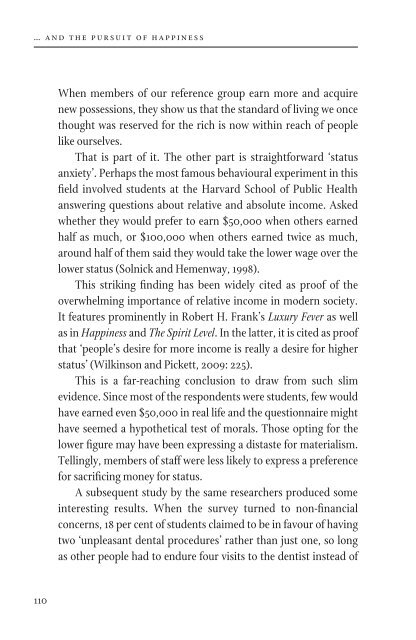… and the Pursuit of Happiness - Institute of Economic Affairs
… and the Pursuit of Happiness - Institute of Economic Affairs
… and the Pursuit of Happiness - Institute of Economic Affairs
Create successful ePaper yourself
Turn your PDF publications into a flip-book with our unique Google optimized e-Paper software.
<strong>…</strong> <strong>and</strong> <strong>the</strong> pursuit <strong>of</strong> happiness<br />
are more equal countries happier?<br />
When members <strong>of</strong> our reference group earn more <strong>and</strong> acquire<br />
new possessions, <strong>the</strong>y show us that <strong>the</strong> st<strong>and</strong>ard <strong>of</strong> living we once<br />
thought was reserved for <strong>the</strong> rich is now within reach <strong>of</strong> people<br />
like ourselves.<br />
That is part <strong>of</strong> it. The o<strong>the</strong>r part is straightforward ‘status<br />
anxiety’. Perhaps <strong>the</strong> most famous behavioural experiment in this<br />
field involved students at <strong>the</strong> Harvard School <strong>of</strong> Public Health<br />
answering questions about relative <strong>and</strong> absolute income. Asked<br />
whe<strong>the</strong>r <strong>the</strong>y would prefer to earn $50,000 when o<strong>the</strong>rs earned<br />
half as much, or $100,000 when o<strong>the</strong>rs earned twice as much,<br />
around half <strong>of</strong> <strong>the</strong>m said <strong>the</strong>y would take <strong>the</strong> lower wage over <strong>the</strong><br />
lower status (Solnick <strong>and</strong> Hemenway, 1998).<br />
This striking finding has been widely cited as pro<strong>of</strong> <strong>of</strong> <strong>the</strong><br />
overwhelming importance <strong>of</strong> relative income in modern society.<br />
It features prominently in Robert H. Frank’s Luxury Fever as well<br />
as in <strong>Happiness</strong> <strong>and</strong> The Spirit Level. In <strong>the</strong> latter, it is cited as pro<strong>of</strong><br />
that ‘people’s desire for more income is really a desire for higher<br />
status’ (Wilkinson <strong>and</strong> Pickett, 2009: 225).<br />
This is a far-reaching conclusion to draw from such slim<br />
evidence. Since most <strong>of</strong> <strong>the</strong> respondents were students, few would<br />
have earned even $50,000 in real life <strong>and</strong> <strong>the</strong> questionnaire might<br />
have seemed a hypo<strong>the</strong>tical test <strong>of</strong> morals. Those opting for <strong>the</strong><br />
lower figure may have been expressing a distaste for materialism.<br />
Tellingly, members <strong>of</strong> staff were less likely to express a preference<br />
for sacrificing money for status.<br />
A subsequent study by <strong>the</strong> same researchers produced some<br />
interesting results. When <strong>the</strong> survey turned to non-financial<br />
concerns, 18 per cent <strong>of</strong> students claimed to be in favour <strong>of</strong> having<br />
two ‘unpleasant dental procedures’ ra<strong>the</strong>r than just one, so long<br />
as o<strong>the</strong>r people had to endure four visits to <strong>the</strong> dentist instead <strong>of</strong><br />
none. Thirteen per cent said <strong>the</strong>y would accept a higher infant<br />
mortality rate ra<strong>the</strong>r than see o<strong>the</strong>r countries have fewer babies<br />
die: <strong>the</strong>se, I repeat, were students <strong>of</strong> public health. When given<br />
<strong>the</strong> option <strong>of</strong> being ill for six days while o<strong>the</strong>rs were sick for two<br />
days, 11 per cent <strong>of</strong> respondents claimed a preference for being<br />
ill for nine days so long as o<strong>the</strong>rs were sick for twelve days. The<br />
same percentage said <strong>the</strong>y would ra<strong>the</strong>r have <strong>the</strong>ir cars broken<br />
into more <strong>of</strong>ten <strong>and</strong> suffer worse air pollution so long as crime<br />
<strong>and</strong> pollution were even worse for o<strong>the</strong>r people (Solnick <strong>and</strong><br />
Hemenway, 2005).<br />
A worldly interpretation <strong>of</strong> <strong>the</strong>se results would be that a significant<br />
minority <strong>of</strong> respondents were not taking <strong>the</strong> experiment<br />
altoge<strong>the</strong>r seriously, or did not underst<strong>and</strong> <strong>the</strong> questions, or else<br />
had a pr<strong>of</strong>oundly strange outlook on life. Whatever <strong>the</strong> truth, it is<br />
clear that <strong>the</strong> battle for status involves much more than income.<br />
If people are prepared to undergo avoidable root canal surgery<br />
to move up a perceived pecking order, it is reasonable to assume<br />
<strong>the</strong>y will compete over almost anything. While relative income<br />
does matter, all sorts <strong>of</strong> o<strong>the</strong>r relative values matter just as much.<br />
By focusing so relentlessly on money, <strong>the</strong> self-proclaimed egalitarians<br />
ignore <strong>the</strong> innate human desire for respect <strong>and</strong> status that<br />
would be no less powerful if material pleasures did not exist.<br />
Can we deal with ‘income envy’ anyway?<br />
Even if we make <strong>the</strong> false assumption that income envy is one <strong>of</strong><br />
<strong>the</strong> main determinants <strong>of</strong> unhappiness in modern society, what<br />
is to be done? The significant thing about relative income, as <strong>the</strong><br />
<strong>the</strong>orists never fail to mention, is not <strong>the</strong> possessions it affords,<br />
but <strong>the</strong> status it confers. It is not <strong>the</strong> size <strong>of</strong> <strong>the</strong> differential which<br />
110 111












